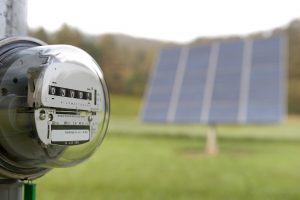Mitchell Center Sustainability Research Grants Fund Array of Projects on Urgent Issues
Community-based Solar Power l Lake Vulnerability Index
Four diverse projects on urgent sustainability issues have each been awarded a 2015 Sustainability Research Grant by the Senator George J. Mitchell Center for Sustainability Solutions. The grant funds innovative projects that further the Mitchell Center’s vision to connect knowledge with action to create a brighter environmental, social, and economic future in and beyond Maine. Projects funded by the grant match the Mitchell Center’s strategy to use innovative approaches to address these intersecting societal factors and resulting sustainability challenges. Each Sustainability Research Grant project is focused on broadening the Mitchell Center’s reach, offering researchers a chance to engage stakeholders in new ways and to produce more actionable knowledge. Two of the four projects are profiled here, with a story on the other two to follow soon.
 Advancing Sustainable Energy in Maine: A Close-Up Look at Community-Based Solar Power
Advancing Sustainable Energy in Maine: A Close-Up Look at Community-Based Solar Power
The advancement of sustainable energy may have a champion in community-based solar power, a UMaine researcher says. The concept has found success in different states around the country, including Massachusetts and Vermont, which could serve as valuable examples for Maine.
Working on a grant provided by the Mitchell Center, Sharon Klein, Assistant Professor in the School of Economics, is examining community solar power in an effort to find answers to various questions: What are the different ways community solar is being implemented? What is motivating this group adoption? What benefits and challenges are associated with community solar? How can this “power of the people” be harnessed to achieve a more sustainable energy system?
“We’re looking at how we might encourage community groups to learn from each other to advance solar energy,” Klein said. “We want to know what motivates people to take action.”
There are a couple of ways grassroots community investment can work. Solarize, a program that began in Portland, Oregon in 2009, allows groups of homeowners or businesses to work together to collectively negotiate solar installation prices, competitively select an installer and increase demand through a creative offer to join the campaign. Massachusetts has 238 Solarize projects and is a national leader in the community solar power movement. Ultimately, as the number of residents who participate in the program increases, the cost of the installations will decrease. In Maine, Solarize Freeport is trying to convince more homeowners to get on board for a bulk solar panel buy before Sept. 30.
Residents in all states are eligible for a 30 percent federal tax credit, which is due to drop to 10 percent at the end of 2016. Maine currently has no state government incentives or rebates to help lower the price of solar panels; although it used to have a rebate of up to $2000 administered through Efficiency Maine. Mainers are eligible for group net metering, which allows up to 10 customers under the same utility to receive an energy credit on their individual electricity bills for solar energy generated from their portion of a shared solar array. Though the host physically sends the energy to the utility, the other 9 investors pay a portion of the installation cost and get a proportional portion of the net savings.
Klein will be taking a look at other innovative programs. Massachusetts and Vermont also offer group-metering policies but don’t limit participation to 10 utility customers. Massachusetts has a Green Communities program to try to help all cities and towns find clean energy solutions. Vermont implemented the Vermont Energy and Climate Change Action Network (VECAN), which helps municipalities in find sustainable energy solutions. These two states have a number of other policies to support individual and community solar, which Klein is including in her research.
Klein will send a web-based survey to community solar project members in all three states with a plan to follow-up with more detailed interviews with select respondents.
“We’re going to ask questions about motivation and knowledge and how people found out about options. We want to know if the benefits received are ones people anticipated and how the costs and benefits compare to more traditional, individual solar investment,” Klein said.
 Creating a “Vulnerability Index” of Maine Lakes: Rating Both Lakes in Danger and Stakeholder Engagement
Creating a “Vulnerability Index” of Maine Lakes: Rating Both Lakes in Danger and Stakeholder Engagement
A new Mitchell Center project will take a unique look at the health of Maine’s lakes. Researchers will take a two-pronged approach, looking at the water quality of lakes in addition to levels of stakeholder engagement.
The project is a pilot program that includes evaluation of 20 Maine lakes selected by researchers. Aria Amirbahman, Professor in the Department of Civil and Environmental Engineering, and team will create a lake “vulnerability index” for the State of Maine.
“We have chosen 20 lakes along the spectrum in terms of water quality and citizen engagement,” Amirbahman said.
The index is of vital importance, Amirbahman said. The state Department of Environmental Protection (DEP) has a limited number of staff available to test water quality. Citizen stewardship is essential to the health of Maine’s lakes, he said
The team has come up with a three by three matrix, which will rate water quality and citizen involvement on a scale of low, medium or high. The index will help researchers evaluate what kind of attention an individual lake needs, be it more water quality monitoring and remediation, more citizen stewardship or both.
Evaluation has already begun with significant variations. Lake Damariscotta, for example, is rated a double medium. Salmon Pond in the Belgrades has low water quality and high citizen involvement.
Team members will interact with citizen scientists on two fronts. Where necessary, they will train citizens to collect water and sediment samples, record temperatures and take other essential measurements. Then the team will take the samples and analyze them at UMaine.
The other component is a questionnaire, which will be sent to citizens in lakefront homeowners associations to measure their level of interest. Team members will then interact directly with citizens to explain results.
The idea is to foster a well-trained brigade of citizen scientists who can collect high quality samples and produce consistently accurate data. Though many of Maine’s lakes continue to have high water quality, Amirbahman said, mant more should be closely monitored over time.
“Climate change alters the chemistry of lakes,” he said. “There are certain factors that make lakes very susceptible to these changes. The state does not have the resources. We need well-trained stewards, especially those who live around these lakes, to be their protectors.”
